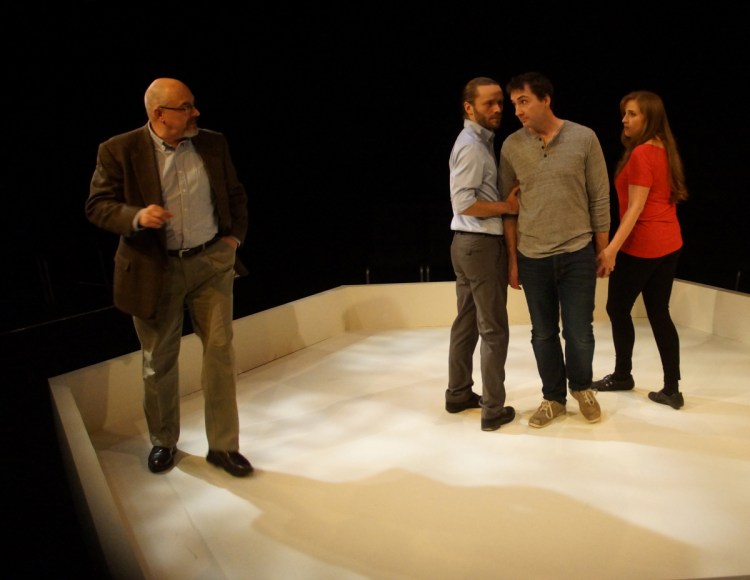“Cock,” staged by Dramatic Repertory Company is an adult play, and not just because of its raunchy moments (no one under 17 is admitted). The production, bereft of much of a set and with zero props, relies on the play’s intense, sophisticated dialogue, which is like jazz, the characters’ emotions firing off in virtuoso percussion.
The actors are confined to a white hexagon in Portland Stage’s black box theater, but the characters are hemmed in by their own powerlessness. The troubled relationship between lovers John (Andrew Sawyer) and M (Ian Carlsen) is evident immediately. M appears to have the upper hand, berating John, who tries to defend himself but doesn’t have much of an answer when M criticizes him for not being able to do anything with his hands, “nothing practical, nothing that needs to be done.”
John sure does find something to do with his hands when, during a time that he and M have split, he meets up with a woman, W (Marjolaine Whittlesey), eventually consummating his first heterosexual relationship. That leaves M on the defensive for a change. Eventually, both M and W implore him to make a choice.
On the surface, this story is about the limits – or, more accurately, the boundlessness – of human sexuality. But playwright Mike Bartlett chucks much concern about story itself in favor of delving well below the surface to explore even deeper questions of human identity, beyond sexual identity. With nothing on stage but each other, the actors must breathe life into characters who mostly emerge through their frustrations and passionate interchanges than by their actions.
And they do. Directors Keith Powell Beyland and Tess Van Horn maintain a manic pace that lives up to the play’s alternate title, “The Cockfight Play,” slowing things down from time to time to catch a breath and inject some humor; at times, you can almost hear a heartbeat. Carlsen’s M is almost frightening at times, his hands like unpinned grenades, his ferocious face intimidating when he’s on the attack and dreadfully mournful when he’s losing.
Whittlesey’s W is the kind of beautiful, feminine woman (M is in for a big surprise when John’s description of her turns out to be something of a ruse) that you might expect could attract any man, even one who’s been gay all of his life; her eyes sparkle, sometimes, seemingly, with electricity. But she’s also modern, strong, rational and direct, eventually perfectly willing to leverage her ability to have children – more than merely flighty feminine wiles – to preserve this relationship. James Herrera as M’s father, F, adds more layers to the conflict, seeking to protect his son’s heart and his own reliance on an emotional status quo. We like our families intact.
John isn’t merely feckless, however, and Sawyer imbues him with an endearing, if sometimes maddening, depth of emotion. The final scene borders on chaotic, but it, like the whole play, remains captivating. “Cock” in its final moments has much in common with Ibsen’s “A Doll’s House” and vividly presents its underlying essential question: How does a person who’s yet to figure out who he is make a choice that requires him to know?
Daphne Howland is a freelance writer living in Portland.
Copy the Story LinkSend questions/comments to the editors.



Success. Please wait for the page to reload. If the page does not reload within 5 seconds, please refresh the page.
Enter your email and password to access comments.
Hi, to comment on stories you must . This profile is in addition to your subscription and website login.
Already have a commenting profile? .
Invalid username/password.
Please check your email to confirm and complete your registration.
Only subscribers are eligible to post comments. Please subscribe or login first for digital access. Here’s why.
Use the form below to reset your password. When you've submitted your account email, we will send an email with a reset code.